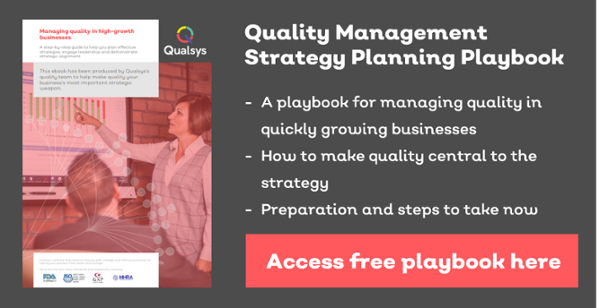Want to contribute to this article?
Implementing a quality management system is as much about people as it is about processes and policies.
To do this faster, easier and more effectively, you need to spend some time at the start making sure you have the best people.
Knowing what to look for in your quality management team will help you deliver a successful and co-ordinated implementation plan.
With the help of Richard Green, Managing Director and founder of Kingsford Consultancy Services, we've put together five tips to help you choose an effective EQMS project team destined for success.
1. Decide how many people you need
One of the trickier aspects of choosing your project team is deciding how many people to involve.
It's tempting to either limit the team to senior management who already know and understand why EQMS is being implemented, or have lots of people from every department.
Here you risk either isolating end users from the process or having 'too many cooks', which will dilute the positive impact a project team can have.
A project team of 4–6 people is ideal. This ensures you remain streamlined and can easily communicate with each other, while also allowing a range of skills and experience to be brought into the mix.
2. Mix up the skills
You'll need a good mix of ideas and action, so make sure you have a range of skills to call on. It's tempting to use people you're familiar with and who you've worked with before, but you could be missing out. A fresh team will have a new dynamic and create a precedent for embracing change, right from the start of the project.
The team must possess the necessary interpersonal skills and technical knowledge to get the job done. Without this you have no chance of success.
- Richard Green, Kingsford Consultancy Services
Talk with line managers of departments before you build your team. Those managers know their teams best, and will be able to recommend individuals based on their skills rather than their experience.
Skills you should look for include good organisation, communication and creativity.
You may find that a less senior member of staff will have a 'game changer' approach that is ideal for the project, or that a 'stay-in-the-background' worker has perfect technical experience.
3. Find people who care
You need individuals who are prepared to put the common cause first.
- Richard Green, Kingsford Consultancy Services
If someone on the team doesn't care about the project, they won't be committed to its success.
As the project progresses, you might find some of the team get disillusioned – especially during roll-out where the biggest resistance to change always occurs.
A good way to keep them motivated is to highlight how the project's success will benefit them personally – for example:
- They could be promoted
- More efficient processes make their job easier
- They won't spend as much time on administrative tasks
- They will have better working relationships
4. Use your champions for 'word on the street'
You've brought EQMS into your company with the aim of continuously improving quality, mitigating risk and making your business more efficient.
But your end users are unlikely to buy in to these reasons as a motive for cultural change.
Having an end user 'champion' who understands and is passionate about the positive changes EQMS will deliver will vastly support you when you roll out EQMS to its eventual users.
You'll benefit from their passion about the project– bringing about change at a grass-roots level – and they'll also be able to provide useful feedback on what is (and isn't) important to your people when it comes to using EQMS.

5. Have strong leadership
The project manager needs to be able to step away from the 'doing' and to delegate. A strong leader is needed for motivation and should be supported by their 'internal quarterback' – the person who manages and motivates team members more closely.
You need strong leaders, people in key roles who are able to get out of those who are working alongside them.
- Richard Green, Kingsford Consultancy Services
Forming your team starts with the backbone, your 'internal quarterback', the person who co-ordinates every play to move towards success.
Depending on the size and complexity of your organisation and the quality management system you use, this could be a full-time or part-time permanent role (a new recruit or an internal promotion), or work alongside another position if the project is relatively small.

Next steps
Access our quality management playbook and take the first steps towards a world class, 'quality first' organisation:









Share your thoughts on this article